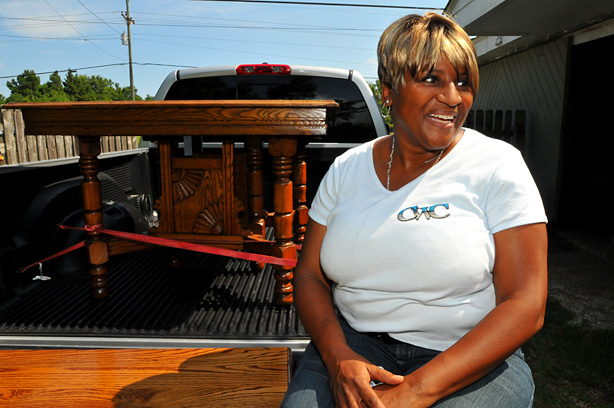Restoration

For Sharon Hanshaw, this is not just a table, it’s a piece of her family history. Photo by Lily Rodrguez/Oxfam America
I knew that Biloxi, Mississippi, was one of the US cities hit hardest by Hurricane Katrina. But I was surprised to see so many signs of the storm still lingering today—especially in lower-income East Biloxi, where many people still lack permanent housing. A lot of local businesses stand empty, and despite some growth, you can sense that the community is still struggling to heal itself.
But there was one thing from my visit that left me feeling hopeful: seeing Sharon Hanshaw get her table back.
Sharon, who lost her house, her car, and her business in the hurricane, now heads the Oxfam partner organization Coastal Women for Change (CWC). As a leader in rebuilding her community, she always has a lot to do, but the day I met her there was one thing she couldn’t miss: picking up her table at 3 p.m. sharp.
As we sat together in her living room, Sharon explained that the only piece of furniture she salvaged after Katrina was a majestic wood dining table that belonged to her mother. The recovered table was a sorry sight: its wood finish dulled, its surface splintered. She repaired it with Gorilla Glue, which hardened in yellow, bulgy ridges. “It was ugly,” she said, laughing. “My daughters told me to throw it away.”
Still, Sharon kept the table with her during her 18 months in a government-issued FEMA trailer. When she moved into her current home—a two-story house with sun-flooded skylights and cocoa-colored walls—the table came too. Except there it looked even shabbier than ever.
When a friend recommended a family-owned furniture restorer’s shop in Biloxi, Sharon finally agreed to part with the table for a little while. And today it was ready at last.
Sharon’s friend and colleague Cass Woods was on hand to transport the table in her pickup. As we drove over, Sharon couldn’t resist calling her: “Well? How does it look?”
“It’s okay,” Cass said neutrally. Sharon sighed.
When we arrived at the restorer’s, a low brick building with the name hand-painted on the window, Sharon jumped out of the car and left the engine running. Then I heard her scream—in joy, or in horror?
Rounding the corner, I glimpsed the table in the back of Cass’ truck, its shiny surface gleaming in the hot sunshine. Up close, the mahogany-colored wood showed a smooth, slightly rippled pattern, like the peaceful waters of the Gulf.
Sharon was crying and hugging Cass, scolding her friend good-naturedly for her deception. Beaming, she jumped on the truck to pose for a photo with her prize (above).
Meanwhile, two middle-aged furniture restorers stood watching in the doorway. I saw one of them turn to the other, puzzled by Sharon’s reaction.
“It’s all she had left,” the second man said quietly.
His colleague nodded in understanding. In a place like Biloxi, that’s all you need to say.